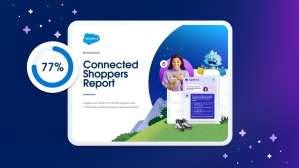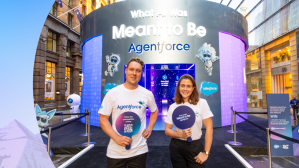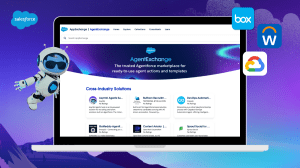Salesforce and Databricks today announced an expanded strategic partnership that delivers zero-ETL (Extract, Transform, Load) data sharing in Salesforce Data Cloud. Customers can now seamlessly merge data from Salesforce Data Cloud with external data from the Databricks Lakehouse Platform. With these new capabilities, businesses can reduce the cost and complexity of moving and copying data while maintaining security, governance, and trust, and use their data and AI models to provide better customer experiences.
Why it matters: As AI adoption surges, 80% of IT leaders acknowledge its capacity to unlock value in their data, the lifeblood of today’s business. However, 41% say their data is too complex or inaccessible to be useful.
The details:
New integration capabilities include:
- Salesforce Data Cloud + Databricks Lakehouse: Bring Your Own Lake (BYOL) allows customers to access data across both Salesforce Data Cloud’s Lakehouse and Databricks Lakehouse data as if they are housed in a single location — with zero-ETL. Data Cloud and Databricks are both built on a lakehouse architecture, which enables them to support bi-directional data federation at the storage level, resulting in a better, lower-latency sharing experience.
- BYOL Data Federation lets customers access their Databricks data from within Salesforce Data Cloud, helping enrich customer profiles.
- BYOL Data Sharing enables customers to access their Salesforce Data Cloud data from within Databricks for richer insights.
- Salesforce Data Cloud + Databricks AI Machine Learning: This integration will enable Zero-ETL data access for AI model training that can maximize a company’s AI investment. It provides immediate access to unified customer data, streamlining the model development process and enhancing the accuracy and efficiency of AI predictions and insights. Customers can then build, train, and optimize their own AI models within Databricks Machine Learning and bring them into Data Cloud to power any application on the Salesforce platform.
With this partnership:
- A bank can connect CRM data, like a customer’s transaction history, credit score, and financial goals, with non-CRM data like market analysis or economic trends. They can then create custom cross-selling models that help recommend additional products or services to advisors based on real-time engagement data from clients.
- A car dealership can connect CRM data, like customer purchase history and service interactions, with non-CRM data like real-time online activity or social media sentiment. They can then deploy custom AI models that predict customers’ likelihood to purchase additional services related to their vehicle, and deliver hyper-personalized recommendations to customers via the most appropriate channel, including email, a mobile app, or social media.
- A gaming studio can connect CRM data, like purchase history and service interaction, with non-CRM data like in-game telemetry or real-time online activity. They can then deploy custom AI models that inform the components and value drivers for their next game.
The big picture: Data Cloud is a hyperscale customer data platform that lets companies unify all their Salesforce data and vast amounts of engagement data from external sources to create harmonized and unified customer profiles. With Data Cloud, businesses can quickly action data across the Salesforce Customer 360 with AI, automation, and analytics across sales, service, marketing, and commerce applications. Databricks’ Lakehouse Platform offers a unified solution for all data, analytics, and AI workloads, from real-time streaming analytics to data science and production machine learning.
Salesforce Data Cloud provides a comprehensive and unified data foundation for enterprises to be successful with AI and personalization.
Rahul Auradkar, EVP & GM, Unified Data Services & Einstein, Salesforce
Salesforce perspective: “Salesforce Data Cloud provides a comprehensive and unified data foundation for enterprises to be successful with AI and personalization. We’re excited to partner with Databricks to provide our customers the ability to share data with zero-ETL, and build and deliver AI models seamlessly to provide new and better ways for companies to anticipate customer needs, offer hyper-personalized services, and provide a better overall experience.” – Rahul Auradkar, EVP & GM, Unified Data Services & Einstein, Salesforce
The Databricks perspective: “Access to trusted, governed data is critical for every company and the ability to combine that data with AI is now essential to remain competitive. Delivering best-in-class integrations with Salesforce builds on our longtime partnership and will enable more organizations to securely share reliable, high-quality data and AI models across platforms, unlocking massive value for our mutual customers.” – Adam Conway, SVP of Products at Databricks
Explore further:
- Read more news and stories from Dreamforce 2023
- Learn more about Einstein, BYOM in Einstein Studio, and Data Cloud



















